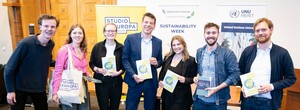A guest post by Noa van Mulken, alumna of last year’s 2021-22 MPP cohort
Due to the increasing concern for the environment and the need to fight climate change, green careers are becoming increasingly popular. A green career is very diverse and can touch upon many different industries, such as renewable energy, sustainability, clean mobility, or even nature or wildlife conservation.
At the recent ‘Growing Green Careers Panel’ event during the UM Sustainability Week, I (together with two other professionals) gave advice on how to grow a green career. If you missed it, below you can find some tips on how to grow your career in this field!

Noa van Mulken (author of this post) speaking at the ‘Growing Green Careers Panel’ event, 19 April 2023. Photo: Peter Mullenberg / Studio Europa Maastricht
✅ Research the diversity of options when choosing a green career
As laid out previously, there are many different types of green careers, which highlights the importance to research and explore your options. Examples could include becoming a sustainability consultant for an IT company, or an environmental scientist at a research institute, or a renewable energy specialist for the municipality, or perhaps you want to go into the field of marine biology. Have a look at job descriptions, the required education or training, and possible career paths for each option to see what would suit you best (e.g. am I the right person for fieldwork, or perhaps not).
✅ Build a strong foundation and choose your minor/major wisely
A strong foundation in for instance conducting research, science, technology (IT), or mathematics can come in handy when pursuing a green career. I speak from experience – I am still grateful that I took those remote sensing classes. Once you have decided which direction you would like to go, focus on developing your skills in those areas by taking additional courses, follow seminars/webinars or participate in any other extracurricular activities based on your interests. Extracurricular activities could be to join a campus sustainability group or volunteer with an environmental organization. This not only advances your knowledge but it will also allow you to meet like-minded people, which is always an enrichment!
✅ Try to incorporate an internship or a job while studying
Hands-on experience in the green industry can not only help build your professional network, but it can also give you an advantage as entry-level green jobs are quite competitive.
✅ Build your presence (especially online)!
As we are living in a digital age, a strong online presence helps you to stand out to potential employers. I would advise creating a LinkedIn profile in which you show your skills, experience, and passion for our planet. You can also use social media platforms like Twitter or Instagram to engage with other young like-minded people and – maybe a little old-fashioned, but it also keeps you up-to-date on the latest news and trends!
To conclude: becoming a green professional requires a combination of education, extracurricular activities, internships, and networking. I hope this helps you to position yourself for success in the green job market, and most importantly thank you for making a positive impact on our natural environment!

Noa (third from right) with the other panelists and the Studio Europa team who hosted the panel event on 19 April. Photo: Peter Mullenberg / Studio Europa
ANY COMMENTS?
NOTA BENE
The opinions expressed here do not necessarily reflect the views of UNU.
MEDIA CREDITS
Photos by Peter Mullenberg / Studio Europa Maastricht and Francesco Gallarotti / Unsplash




